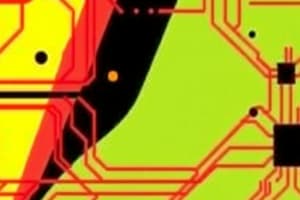Podcast
Questions and Answers
एतत् किं विषयं विद्यते यत्र परिकल्पितम्?
एतत् किं विषयं विद्यते यत्र परिकल्पितम्?
एलेक्ट्रोनिक्स्
किमर्थं आनलॉग् इलेक्ट्रॉनिक्स् महत्वपूर्णमस्ति?
किमर्थं आनलॉग् इलेक्ट्रॉनिक्स् महत्वपूर्णमस्ति?
छायामानकरणाय
किमर्थं ट्रान्सिस्टर्स्थानकर्तुं प्रयोजनमस्ति?
किमर्थं ट्रान्सिस्टर्स्थानकर्तुं प्रयोजनमस्ति?
अवाद्यं बहुस्थानं प्राप्तुं
सेमीकन्डक्टराणां मुख्यो लक्षणं किमस्ति?
सेमीकन्डक्टराणां मुख्यो लक्षणं किमस्ति?
इति सिलिकन्नाम्ना जाने यत्र अधिकं मन्यते?
इति सिलिकन्नाम्ना जाने यत्र अधिकं मन्यते?
का कारणं है जितेरितु सर्वानाम् एते विद्यमानत्वं और परिपाकः?
का कारणं है जितेरितु सर्वानाम् एते विद्यमानत्वं और परिपाकः?
किं विद्यानाम् किरणितुस्सम्विधानम् कथयते?
किं विद्यानाम् किरणितुस्सम्विधानम् कथयते?
कः विद्युत् क्षेत्रमिथुनः विद्युत्संवेगः उत्पत्तिम् ददाति?
कः विद्युत् क्षेत्रमिथुनः विद्युत्संवेगः उत्पत्तिम् ददाति?
कः लोकः बायनर्यान्त्रिकः निगमने कृतः को अस्ति?
कः लोकः बायनर्यान्त्रिकः निगमने कृतः को अस्ति?
किं विद्युत्चालनस्य अभियन्त्रणम् उद्दिश्य एते तात्कालिकस्य कार्याणि कुर्वन्ति?
किं विद्युत्चालनस्य अभियन्त्रणम् उद्दिश्य एते तात्कालिकस्य कार्याणि कुर्वन्ति?
Flashcards are hidden until you start studying
Study Notes
Physics
Analog Electronics
Analog electronics is a field of electronic engineering dealing with continuous signals such as voltage, current, power, energy, charge, etc. It involves electronic components such as resistors, capacitors, inductors, transistors, diodes, vacuum tubes, amplifiers, etc., that function by allowing the passage of electrical charges or magnetic fields along a conductor. Analog electronics has applications in signal conditioning, control systems, communication systems, measurement instruments, and other electrical devices.
Transistor Amplifier Circuits
A widely used application of analog electronics is designing and building amplifier circuits using transistors. A transistor amplifier circuit can have multiple stages to achieve high levels of gain, which means it can amplify very small input signals into larger output signals to drive speakers or microphones, among others.
Semiconductors
Semiconductor materials, including silicon, gallium arsenide, germanium, and many more, play a crucial role in modern technology due to their unique properties between conductors and insulators. They control the flow of electric current through electronic equipment like computers, smartphones, solar panels, LED lighting, and much more.
Silicon Materials
Silicon is the most commonly used semiconductor material, accounting for approximately half of all semiconductor demand globally. Its favorable price, availability, and maturity as a manufacturing platform contribute to its popularity.
Electromagnetism
Electromagnetism is a fundamental theory of physics describing how electrically charged particles interact. It combines two classical physical sciences, electricity and magnetism, showing they are different manifestations of the same phenomenon.
Magnetic Field
The interaction between magnets and moving electrical charges give rise to the concept of a magnetic field. Essentially, every moving charge creates a magnetic field, while every magnetic object is surrounded by an invisible force acting on moving charges. This interplay between electricity and magnetism underpins technologies such as motors, generators, transformers, solenoids, relays, and even MRI scanners.
Digital Electronics
Digital electronics deals with discrete information and processes in binary form. Developed from principles of Boolean logic and characterized by a wide range of mathematical pattern recognition, digital electronics has emerged as a critical element within nearly all facets of our lives today.
Logic Gates
Logic gates serve as basic units of digital circuits, performing Boolean operations. Some common logical operations include AND, OR, NOT, XOR, NAND, NOR, XNOR, and so on.
Electric Circuits
An electric circuit is a network of conducting components designed to direct electric current towards particular loads in order to perform designated tasks. These components include batteries, resistors, capacitors, switches, and filaments, which can be connected together in various ways to create complex functionality.
Studying That Suits You
Use AI to generate personalized quizzes and flashcards to suit your learning preferences.




